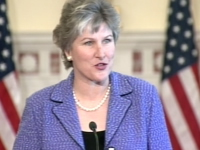The nation's capital has been in an uproar this week over the U.S. attorney firings controversy. Both the House and Senate Judiciary Committees held hearings Tuesday on the matter, where six of eight former U.S. attorneys (all fired in late 2006) testified that they had been the target of complaints, telephone calls and threats from either a high-ranking Justice Department official or members of Congress in the days and weeks preceding their abrupt dismissals. The replacements for the attorneys are rumored to be political appointees with little prosecutorial experience.
The story dates back to March 2006, when President Bush signed the reauthorization of the USA Patriot Act. The bill included a provision (inserted by a staffer to Sen. Arlen Specter (R-Pa.) at the request of the Justice Department) allowing the DOJ to appoint U.S. attorneys indefinitely without a presidential nomination or Senate confirmation (previously, this type of appointment could last only a maximum of 120 days). In late 2006, the administration fired eight U.S. attorneys, insisting each dismissal was motivated by performance.

 The U.S.
The U.S. The Washington Times reports on the
The Washington Times reports on the